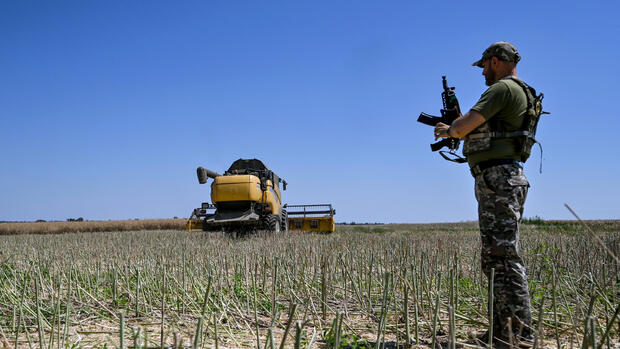Grains and other foodstuffs are important export goods for Ukraine.
(Photo: dpa)
Geneva At the United Nations, the Black Sea Pact is now a top priority. Secretary-General António Guterres is “ready to speak to the President,” a UN spokesman said this week. In a letter, Guterres made suggestions to save the initiative.
Because time is running out: on Monday, July 17, the Black Sea Grain Initiative, which has been extended several times, ends. Then there is a threat of price increases on the global food markets. This is the assumption of the chief economist of the UN Food and Agriculture Organization (FAO), Maximo Torero.
“Shipping these goods helps stabilize world markets. Buyers, including low-income countries, benefit from lower prices,” Torero told Handelsblatt. “The alternative modes of transport via rail, road or rivers cannot compensate for exports via sea transport.”
Under the pact, Ukraine has shipped more than 32 million tons of food across the Black Sea. Deliveries of grain, cooking oil and other agricultural products have fallen by several million tons in recent months.
>> Read here: “The waiting room is a dangerous place” – How the West wants to protect Ukraine until it joins NATO
However, they contributed to a sustained reduction in global food prices. According to the UN, prices are now more than 23 percent below the record levels of March 2022.
The Black Sea Initiative also has a political dimension. It demonstrates that bitter enemies Russia and Ukraine can come to an understanding.
The EU could accommodate Russia
Russia is now threatening once again not to extend the deal. Most recently, the Russian ambassador to the UN in Geneva, Gennady Gatilov, stressed that there was no reason to preserve the “status quo” of the agreement. Russia’s Foreign Minister Sergei Lavrov rumbled: “I don’t know what arguments can be put forward by those who want to continue the Black Sea Initiative.”
Moscow is now making a number of demands: The Russian Agricultural Bank (Rosselkhozbank) should be reconnected to the Swift payment system, which banks use to process money transfers among themselves.
In fact, the EU is now considering connecting a subsidiary of the bank to Swift, Reuters reports. In addition, Moscow is demanding that a pipeline for Russian ammonia, a basic fertilizer, be put back into service in Odessa, Ukraine.
It is currently unclear whether this can be done. According to the Russian Defense Ministry, Ukrainian units blew up a section of the pipeline in a “terrorist act”.
Russia is also allowed to export
Ukraine and Russia were among the world’s top agricultural exporters before the launch of Putin’s full-scale invasion on February 24, 2022. “Before the war began, over 90 percent of Ukrainian exports, around five million tons a month, went through the Black Sea ports,” explains FAO chief economist Torero.
>> Read here: Ukrainian farmers are suffering from the effects of the war – the harvests could soon be significantly worse
However, after the Russian invasion of the neighboring country, the Kremlin forces blocked Ukrainian exports across the Black Sea. Almost a year ago, Ukraine, Russia and Turkey agreed on the initiative in Istanbul. UN Secretary-General Guterres mediated. The parties agreed on the safe export of Ukrainian grain and other agricultural products from Odessa and two other ports.
The contractors gave protection guarantees and agreed inspections. This is to prevent arms smuggling. A second agreement was reached in Istanbul between the United Nations and Russia. In a memorandum, the UN agreed to support the unimpeded export of Russian food and fertilizers to world markets.
With the memorandum, the UN bought Putin’s approval of the Black Sea Grains Initiative, so to speak. Russia now claims not to benefit from this deal.
More: Why July will be decisive for agricultural commodities
